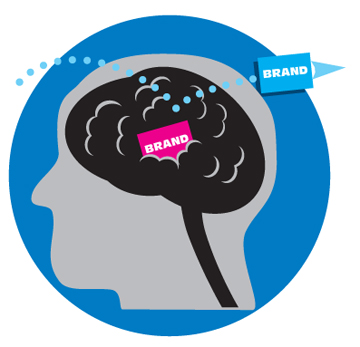 I forgot! I just walked into my assistant’s office to do something, but
between my office and hers, I forgot what I was looking for. Has this happened
to you? It seems to happen to me quite often. It typically happens when I have
several things to do and my mind is whirling about; thinking about the next
chore before the current task is finished. At least that is what I am telling
my children, who insist it is senility!
I forgot! I just walked into my assistant’s office to do something, but
between my office and hers, I forgot what I was looking for. Has this happened
to you? It seems to happen to me quite often. It typically happens when I have
several things to do and my mind is whirling about; thinking about the next
chore before the current task is finished. At least that is what I am telling
my children, who insist it is senility!
There is a connection between human memory and marketing. As a brand
manager, I want consumers to remember my business name and logo. But I also
want them to remember more, such as what the logo and name are all about – what
kind of products and services we provide and where we are a cut above the
competition. I want them to remember our tagline and our sub-brands. I want all
of that to happen at just the mention of my brand or a sighting of my logo. For
that to happen, I have to get my marketing message engrained in the brains of
consumers. For that to happen, I have to cross the barrier between short-term
and long-term memory.
There have been a lot of scientists who have studied and written about
human memory. Though many of them don’t necessarily agree on how many types of
memory there are, they all agree that there are bits of information we learn
for the short term and then forget, and others we remember for the rest of our
lives. Short-term memory may have a functional benefit that lasts only a
limited time benefit to us. For instance, I stayed at a hotel for one day last
week and I was given the wifi server and password for the site. I recalled both
of these bits of information while I was there, but I could not begin to tell
you what they were now. On the other hand, some items that are functional stay
with us for a lifetime. I can recall my family’s telephone number from when I
was 8 years old. I have not used that phone number for decades, but I still
remember it without hesitation.
Why did the wifi server and password only stay in my memory for one day
and my old phone number has been with me all my life? It could be that I had to
dial that phone number hundreds of times while I was growing up. It could be
that sheer repetition made it stick in my long-term memory. There is a case for
that in marketing. We know that the more someone hears the name of our brand or
sees our logo, the more likely they are to remember it. However, it may have to
do with the good feelings associated with that number. Why did I need to know
my phone number as a young boy? It was the number I gave my friends when I
wanted them to call me. There were very positive emotions, like joy, tied to
that number. But there are other feelings tied to the number. It is the number
I used to contact my mother to come and pick me up after school or when I was
at an event. You could say that psychologically, there was a very comforting
thought associated with that number. I was using it to return to a loving
place. Think of my angst if I dialed that phone number wrong and kept ringing
someone else instead of my home! Think what would have happened if I were 8
years old and I couldn’t contact my mother. What then? Precipitous fear would
have surrounded the number and I probably would have forgotten it (or buried it
deep in my psyche for a counselor to drag out of my mind someday.)
In marketing, we use emotion to help people remember us. If you tie your
brand to happy emotions, you have a better chance of consumers remembering you
for a long time. But the same can be said if you can turn bad times into good.
Easing someone’s pain is very marketable – and people will remember you. Just
think: what would you do if you had a headache? I would venture to say that you
just thought you could take Tylenol or Advil. What you didn’t think is you
would take Ibuprofen or Acetaminophen. Why? Because you know the solution by
the brand. It is in your long-term memory.
For brand marketing to be effective, you have to engage your customers’
long-term memory. Repetition will certainly help, but to engage them on an
emotional level will help them remember.